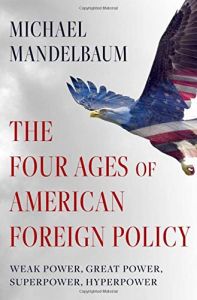Rejoignez getAbstract pour lire le résumé !

Rejoignez getAbstract pour lire le résumé !
Michael Mandelbaum
The Four Ages of American Foreign Policy
Weak Power, Great Power, Superpower, Hyperpower
Oxford UP, 2022
Aperçu
The United States has gone from bit player to “hyperpower” in geopolitics.
Recommendation
America’s leading role on the world stage came only after a century of obscurity, followed by decades as an emerging power, writes foreign policy expert Michael Mandelbaum in this engaging read. US hegemony was anything but assured, he explains, and while American ingenuity gets much of the credit, sheer luck also played a part: Had the British focused on crushing the colonial rebellion, had the French not given up the Louisiana Territory or had a European power backed the Confederacy, the United States might never have achieved its spot atop the global pecking order. This enlightening overview casts the historical record in a new context.
Summary
About the Author
Michael Mandelbaum is the director of the American Foreign Policy program at the Johns Hopkins University School of Advanced International Studies. He is the author of 10 books on US foreign policy.





















Comment on this summary